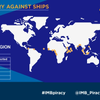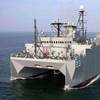Israel-Palestinian Sea Feud Harms Gaza Fishermen
After hours casting their nets close to the Gaza shore, Palestinian fishermen sift through their catch in the dim dawn light, managing to scrape together a few piles of puny fish.
It's a miserable catch, the result, they say, of restrictions imposed by Israel, with boats allowed only three nautical miles (5.6 km) offshore after a month of no fishing at all during the recent fighting.
For years Gaza's fishing community - once one of its proudest and most productive industries - has been caught in the middle of a maritime feud, part of a wider conflict between the blockaded Palestinian enclave and Israel.
As Palestinian and Israeli negotiators meet independently with Egyptian officials to try to reach an agreement to end the latest conflict that began on July 8, maritime rights are one of the critical issues up for discussion.
The Palestinians want Israel to allow fishermen to sail up to 12 nautical miles from the shore - the internationally defined limit for a nation's waters - so that they can net greater numbers of larger fish.
Over the past eight years, Israel has set a six-mile limit for Gaza's fishermen when tensions were lower, restricting it to three miles when hostilities have escalated.
Israel says Gaza's sea, air and land blockade aims to prevent Hamas, the Islamist group which runs Gaza, from acquiring weapons or materials that could be used against the Jewish state.
Since Israel responded to rocket fire from Gaza with airstrikes and a ground invasion, fighting that left more than 1,900 Palestinians and 64 soldiers and three civilians in Israel dead - fishermen have been even more restricted, barely leaving the shoreline.
"They brought us back to zero," said fisherman Khalid Abu Riyad, 50, on a jetty before heading out to sea before dawn.
Dangerous Waters
The United Nations food agency estimates 3,600 Gaza households are involved in fishing. Just under half of those have no other source of income.
"The livelihood of these people is completely jeopardised," said Ciro Fiorillo, head of the U.N. Food and Agriculture Organization's operations in Gaza and the West Bank.
The agency estimates that the latest conflict deprived fishermen of around 200-250 tonnes of fish, or 9-10 percent of their average annual catch under a six-mile restriction.
Fishermen describe being shot at or harassed by Israeli naval vessels, sometimes even when they are inside the allocated fishing zone, which is marked with illuminated red warning buoys. They say Israel has sometimes confiscated equipment and on occasion they have had to abandon it if they came under fire.
"It is very dangerous, after six miles there may be shooting," said Suboh al-Hesi, a 36-year-old fisherman.
Hesi earns 20-30 shekels ($6-9) a day but often comes back empty-handed. The past four years have been especially tough, he says: fuel has tripled in price since 2006 and competition has increased because more men started to fish when they lost their jobs on the land.
Before the restrictions, he was able to catch sea bream, grouper and other larger fish. Now he is lucky if he gets a bucket of small crabs or sardines, which are far less valuable.
The fishing community say they need the fishing zone to be expanded to at least 10 miles and ideally to 12, where schools of fish are more prevalent.
"Gaza is an area that is a fish passage, a transit area," said a 49-year-old fisherman who gave his name as Abu Mohammad. Fish do not stay close to the shore but sweep by further out and that is where the fishermen need to be, he said.
Instead of serving fish caught miles from their doorstep, the stretch of restaurants close to the shore offer farmed, frozen seafood, or fish smuggled in through tunnels from Egypt.
Asaad Abu Hasira, 53, recalled that before 2000, his fish restaurant and the industry were thriving.
"It was excellent, tourists used to come from Arab countries. There were foreign and local tourists and international delegations," he said at his coastal business, which has been serving up fish since 1955.
Twenty years ago, Israelis would come as tourists to Gaza and eat in the restaurants. Fishermen would even export their catch to Israel, said Hasira, who comes from a fishing family.
For him, the maritime feud has done more than restrict livelihoods, it has harmed cultural links with the sea.
"Part of Palestinian society lives by the sea and works by the sea. There is a greater fishing tradition than in Israel," he said, adding that he cannot bring himself to give up.
"I love fish, if I am away from the sea, I die - like a fish."
(By Sylvia Westall, Additional reporting by Ori Lewis in Jerusalem; Editing by Raissa Kasolowsky)













